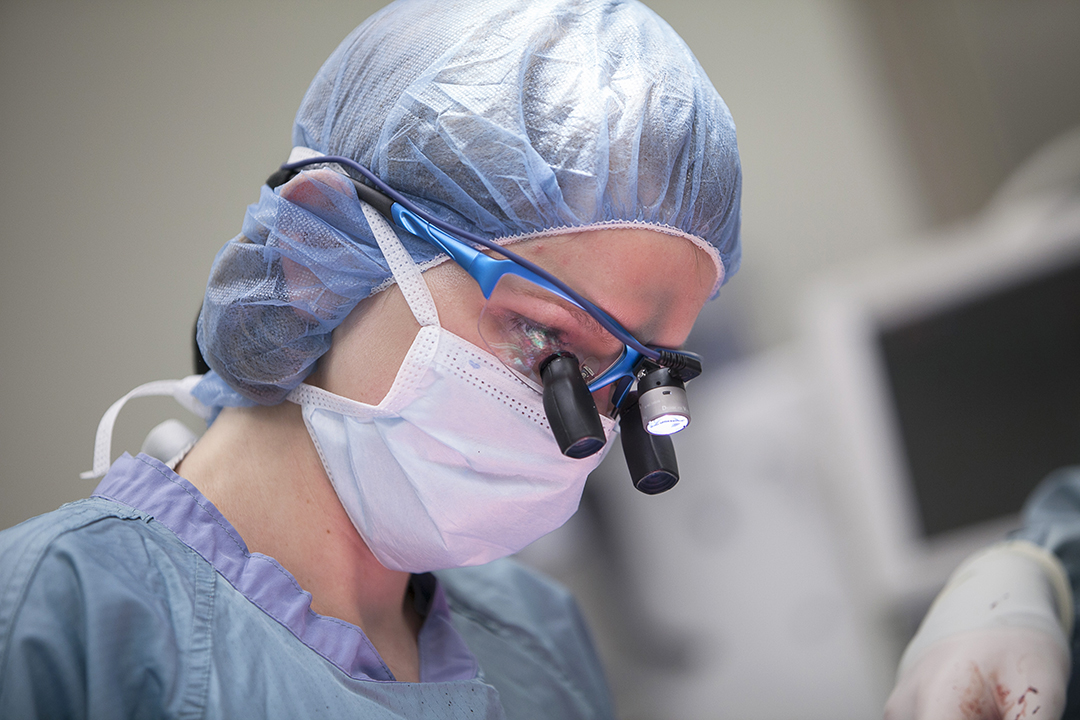
From brain teasers to brain specialist
Dr. Danielle Zwueste has been hooked on veterinary medicine since she was a teenager, but it was her affinity for solving puzzles that inspired her to become a veterinary neurologist.
By Lynne Gunville“I always liked neurology because it’s like a logic puzzle, and that’s how my brain works,” explains Zwueste, an assistant professor at the Western College of Veterinary Medicine (WCVM). “Each case is different, and I love putting the puzzle pieces together, tying all of the clinical signs to the anatomy, figuring out where the problem is and how we can fix it.”
Zwueste credits her fourth-year clinical rotation in small animal internal medicine at the WCVM for her decision to pursue further training once she’d completed her Doctor of Veterinary Medicine degree in 2012.
By the time Zwueste had finished a one-year clinical internship at Toronto’s Veterinary Emergency Clinic, she knew neurology was the perfect fit. Her next move was to the University of California, Davis, where she began a residency in neurology and neurosurgery. There, Zwueste worked within a supportive team of faculty and fellow residents that she describes as her “little neuro family.”
She still remembers her first brain surgery on a sweet cat named Barley: “Being able to work up the case, being involved in the brain surgery and then having the cat do well after — that all really stuck with me. I still have a picture of Barley in my office.”
Two years ago, Zwueste became board-certified in veterinary neurology. At the same time, the WCVM was looking to hire a neurologist. “It was like the job was gift-wrapped for me. I could not have looked for a job that was more perfect for me. Being able to come back and work with all of my old mentors — I just could not say no to that,” says Zwueste.
While she was happy to return to Canada and live closer to her parents and siblings, she was also eager to be part of an academic institution where she could work with the students in the clinic as well as in formal lectures.
Zwueste particularly enjoys the crossover between clinics and teaching — the chance to work with fourth-year students on actual cases and guide them through the process of taking a history, assessing a patient’s function, deciding on appropriate tests and then using all of that information effectively.
“That’s where a lot of the teaching comes in — making sure the students are able to do the neurological exams and then localize the lesions — put the signs together to figure out where the problem is,” Zwueste explains.
As a clinician, Zwueste appreciates the college’s collaborative approach as well as its unique access to other specialities. She also values access to advanced diagnostic equipment such as magnetic resonance imaging and computed tomography.
As Saskatchewan’s only veterinary neurologist, Zwueste treats a variety of diseases and disorders in patients referred to her by veterinarians throughout Western Canada and the northern U.S.
“I see about 50 per cent medical cases and 50 per cent surgical,” Zwueste explains. “A lot of the medical cases are seizures, and then there are a few autoimmune diseases that affect the brain. I treat a lot of dogs with intervertebral disc disease that need surgery to remove the pressure on the spinal cord, and I do skull surgeries and brain surgeries, although they’re certainly not that common.”
Zwueste also looks forward to expanding her research experience. She’s just completed a study that focused on improving assessments of vision loss in pets, and she’s also investigating the effectiveness of some alternative teaching methods. The breadth of research possibilities at the WCVM and the opportunities to work with other University of Saskatchewan researchers is exciting for Zwueste.
“I’ve had a lot of chances to collaborate with the human neurologists over at RUH [Saskatoon’s Royal University Hospital]. That’s been really exciting, and it’s opened up a whole new world for me. One Health is a really big initiative, and this is a great way to combine human and veterinary medicine.”
Zwueste is happy to be back in Saskatoon with its wealth of opportunities for recreation and relaxation. She enjoys biking and hiking, and she’s recently taken up performing with aerial silks — a hobby she describes as “Cirque du Soleil for amateurs.” She also likes spending her leisure time with her WCVM network of friends and co-workers.
“It’s great to be able to collaborate with some of the people who taught me, and I like that I’m able to help grow the university by actually starting the neurology service — create something from the ground up and shape it and take the service in the direction I think veterinary medicine is going.”
Click here to read the story of Toby, one of Zwueste's recent neurology patients.
